过去分词作宾语补足语
人教版高中英语必修五过去分词作宾语补足语
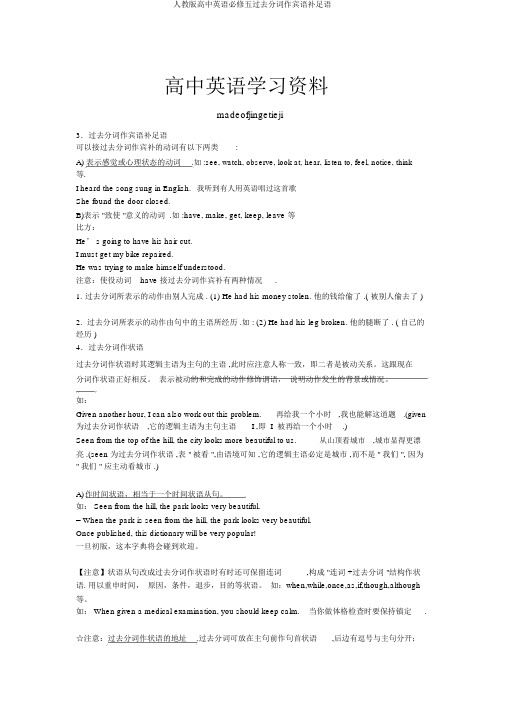
高中英语学习资料madeofjingetieji3.过去分词作宾语补足语可以接过去分词作宾补的动词有以下两类:A) 表示感觉或心理状态的动词.如 :see, watch, observe, look at, hear, listen to, feel, notice, think 等.I heard the song sung in English.我听到有人用英语唱过这首歌She found the door closed.B)表示 "致使 "意义的动词 .如 :have, make, get, keep, leave 等比方:He’ s going to have his hair cut.I must get my bike repaired.He was trying to make himself understood.注意:使役动词have 接过去分词作宾补有两种情况.1.过去分词所表示的动作由别人完成 . (1) He had his money stolen. 他的钱给偷了 .( 被别人偷去了 )2.过去分词所表示的动作由句中的主语所经历 .如 : (2) He had his leg broken. 他的腿断了 . ( 自己的经历 )4.过去分词作状语过去分词作状语时其逻辑主语为主句的主语 ,此时应注意人称一致,即二者是被动关系。
这跟现在分词作状语正好相反。
表示被动的和完成的动作修饰谓语,说明动作发生的背景或情况。
如:Given another hour, I can also work out this problem.再给我一个小时,我也能解这道题.(given 为过去分词作状语,它的逻辑主语为主句主语I ,即 I 被再给一个小时.)Seen from the top of the hill, the city looks more beautiful to us.从山顶看城市,城市显得更漂亮 .(seen 为过去分词作状语 ,表 " 被看 ",由语境可知 ,它的逻辑主语必定是城市 ,而不是 " 我们 ", 因为" 我们 " 应主动看城市 .)A)作时间状语,相当于一个时间状语从句。
过去分词作宾语补足语

过去分词作宾语补足语过去分词作宾语补足语,表示被动的、完成的动作,宾语补足语与宾语之间常常存在逻辑上的动宾关系,即宾语是过去分词所表示的动作的承受者。
【归纳】可以接过去分词作宾语补足语的(短语)动词有:1. watch, see, observe, look at, hear, listen to, find, notice等感官动词。
如:I watched the desk carried out of the classroom.The man found his hometown entirely destroyed.2. make, get, have, keep, leave等使役动词。
如:My mother has her hair cut every two months.We must get the work finished before 6 o’clock.The speaker didn’t know how to make himself understood.3. want, order等表示希望、命令等意义的动词。
如:All of us wanted such questions discussed at the meeting.The manager ordered the problem settled as soon as possible.【拓展】★介词with后也可接过去分词作宾语补足语,构成with复合结构。
如:With more flowers planted, the garden looks very beautiful.★动词⁃ing形式、过去分词和不定式作宾语补足语的区别:动词⁃ing形式和不定式作宾语补足语,宾语是其动作的执行者。
动词⁃ing形式强调动作的正在进行或延续性,不定式强调动作的全过程。
过去分词作宾语补足语,通常宾语是其动作的承受者,多强调动作的完成。
初中英语过去分词作宾语补足语精讲
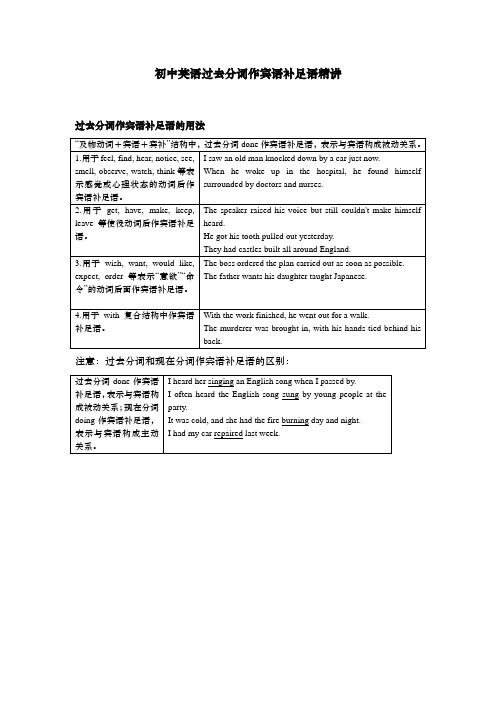
注意:过去分词和现在分词作宾语补足语的区别:
过去分词done作宾语补足语,表示与宾语构成被动关系;现在分词doing作宾语补足语,表示与宾语构成主动关系。
I heard hersingingan English song when I passed by.
The boss ordered the plan carried out as soon as possible.
The father wants his daughter taught Japanese.
4.用于with复合结构中作宾语补足语。
With the work finished, he went out for a walk.
The speaker raised his voice but still couldn't make himself heard.
He got his tooth pulled out yesterday.
They had castles built all around England.
3.用于wish, want, would like, expect, order等表示“意欲”“命令”的动词后面作宾语补足语。
I often heard the English songsungby young people at the party.
It was cold, and she had the fireburningday and night.
I had my carrepairedlast week.
过去分词作宾补
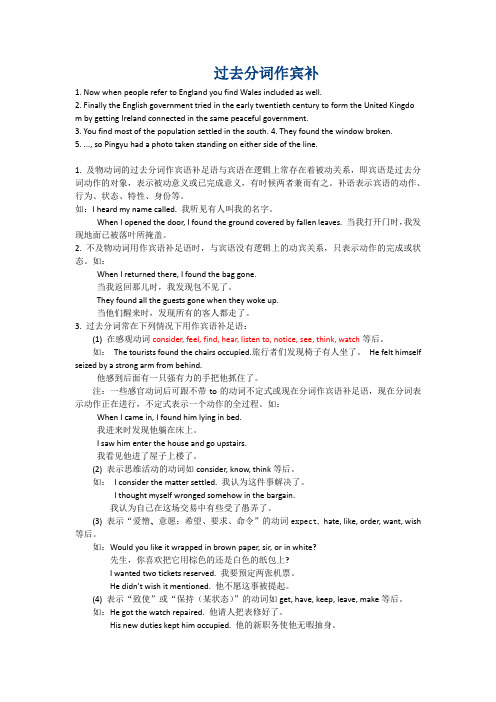
过去分词作宾补1. Now when people refer to England you find Wales included as well.2. Finally the English government tried in the early twentieth century to form the United Kingdom by getting Ireland connected in the same peaceful government.3. You find most of the population settled in the south.4. They found the window broken.5. ..., so Pingyu had a photo taken standing on either side of the line.1. 及物动词的过去分词作宾语补足语与宾语在逻辑上常存在着被动关系,即宾语是过去分词动作的对象,表示被动意义或已完成意义,有时候两者兼而有之。
补语表示宾语的动作、行为、状态、特性、身份等。
如:I heard my name called. 我听见有人叫我的名字。
When I opened the door, I found the ground covered by fallen leaves. 当我打开门时,我发现地面已被落叶所掩盖。
2. 不及物动词用作宾语补足语时,与宾语没有逻辑上的动宾关系,只表示动作的完成或状态。
如:When I returned there, I found the bag gone.当我返回那儿时,我发现包不见了。
They found all the guests gone when they woke up.当他们醒来时,发现所有的客人都走了。
3. 过去分词常在下列情况下用作宾语补足语:(1) 在感观动词consider, feel, find, hear, listen to, notice, see, think, watch等后。
过去分词作定语,表语,宾语补足语
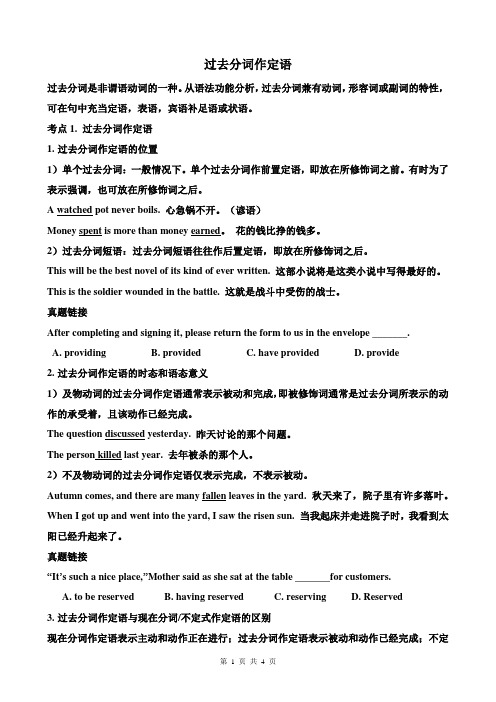
过去分词作定语过去分词是非谓语动词的一种。
从语法功能分析,过去分词兼有动词,形容词或副词的特性,可在句中充当定语,表语,宾语补足语或状语。
考点1. 过去分词作定语1.过去分词作定语的位置1)单个过去分词:一般情况下。
单个过去分词作前置定语,即放在所修饰词之前。
有时为了表示强调,也可放在所修饰词之后。
A watched pot never boils. 心急锅不开。
(谚语)Money spent is more than money earned。
花的钱比挣的钱多。
2)过去分词短语:过去分词短语往往作后置定语,即放在所修饰词之后。
This will be the best novel of its kind of ever written. 这部小说将是这类小说中写得最好的。
This is the soldier wounded in the battle. 这就是战斗中受伤的战士。
真题链接After completing and signing it, please return the form to us in the envelope _______.A. providingB. providedC. have providedD. provide2.过去分词作定语的时态和语态意义1)及物动词的过去分词作定语通常表示被动和完成,即被修饰词通常是过去分词所表示的动作的承受着,且该动作已经完成。
The question discussed yesterday. 昨天讨论的那个问题。
The person killed last year. 去年被杀的那个人。
2)不及物动词的过去分词作定语仅表示完成,不表示被动。
Autumn comes, and there are many fallen leaves in the yard. 秋天来了,院子里有许多落叶。
When I got up and went into the yard, I saw the risen sun. 当我起床并走进院子时,我看到太阳已经升起来了。
过去分词作宾语补足语
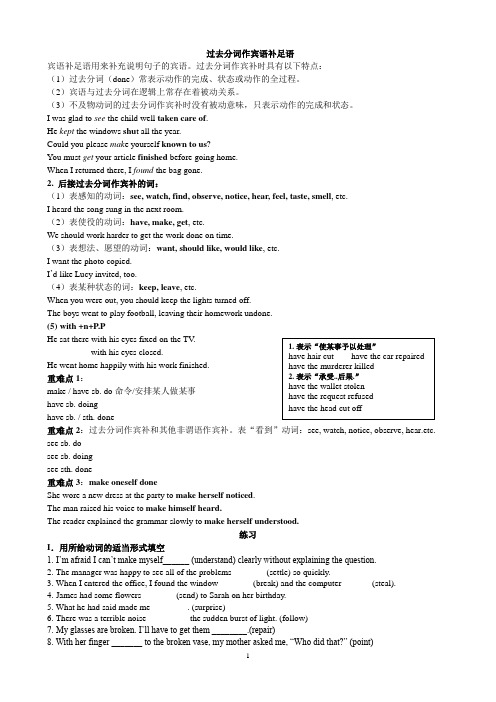
过去分词作宾语补足语宾语补足语用来补充说明句子的宾语。
过去分词作宾补时具有以下特点:(1)过去分词(done )常表示动作的完成、状态或动作的全过程。
(2)宾语与过去分词在逻辑上常存在着被动关系。
(3)不及物动词的过去分词作宾补时没有被动意味,只表示动作的完成和状态。
I was glad to see the child well taken care of .He kept the windows shu t all the year.Could you please mak e yourself known to us ?You must get your article finished before going home.When I returned there, I found the bag gone.2. 后接过去分词作宾补的词:(1)表感知的动词:see, watch, find, observe, notice, hear, feel, taste, smell , etc.I heard the song sung in the next room.(2)表使役的动词:have, make, get , etc.We should work harder to get the work done on time.(3)表想法、愿望的动词:want, should like, would like , etc.I want the photo copied.I ’d like Lucy invited, too.(4)表某种状态的词:keep, leave , etc.When you were out, you should keep the lights turned off.The boys went to play football, leaving their homework undone.(5) with +n+P.PHe sat there with his eyes fixed on the TV . with his eyes closed. He went home happily with his work finished. 重难点1: make / have sb. do 命令/安排某人做某事 have sb. doing have sb. / sth. done重难点2:过去分词作宾补和其他非谓语作宾补。
过去分词作宾语补足语
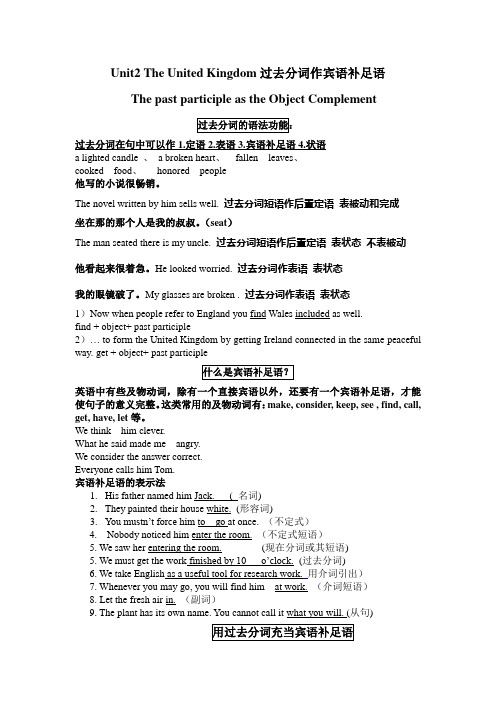
Unit2 The United Kingdom过去分词作宾语补足语The past participle as the Object Complement过去分词在句中可以作1.定语2.表语3.宾语补足语4.状语a lighted candle 、a broken heart、fallen leaves、cooked food、honored people他写的小说很畅销。
The novel written by him sells well.过去分词短语作后置定语表被动和完成坐在那的那个人是我的叔叔。
(seat)The man seated there is my uncle.过去分词短语作后置定语表状态不表被动他看起来很着急。
He looked worried. 过去分词作表语表状态我的眼镜破了。
My glasses are broken .过去分词作表语表状态1)Now when people refer to England you find Wales included as well.find + object+ past participle2)… to form the United Kingdom by getting Ireland connected in the same peaceful way. get + object+ past participle英语中有些及物动词,除有一个直接宾语以外,还要有一个宾语补足语,才能使句子的意义完整。
这类常用的及物动词有:make, consider, keep, see , find, call, get, have, let等。
We think him clever.What he said made me angry.We consider the answer correct.Everyone calls him Tom.宾语补足语的表示法1.His father named him Jack. ( 名词)2.They painted their house white.(形容词)3.You mustn’t force him to go at once.(不定式)4. Nobody noticed him enter the room.(不定式短语)5. We saw her entering the room. (现在分词或其短语)5. We must get the work finished by 10 o’clock.(过去分词)6. We take English as a useful tool for research work.用介词引出)7. Whenever you may go, you will find him at work.(介词短语)8. Let the fresh air in.(副词)9. The plant has its own name. You cannot call it what you will. (从句)过去分词作宾语补足语,表示动作已经完成或结束。
能跟过去分词作宾语补足语的动词总结

能跟过去分词作宾语补足语的动词总结下载温馨提示:该文档是我店铺精心编制而成,希望大家下载以后,能够帮助大家解决实际的问题。
能跟过去分词作宾语补足语的动词总结该文档下载后可定制随意修改,请根据实际需要进行相应的调整和使用,谢谢!并且,本店铺为大家提供各种各样类型的实用资料,如教育随笔、日记赏析、句子摘抄、古诗大全、经典美文、话题作文、工作总结、词语解析、文案摘录、其他资料等等,如想了解不同资料格式和写法,敬请关注!Download tips: This document is carefully compiled by the editor. I hope that after you download them, they can help you solve practical problems. The document 能跟过去分词作宾语补足语的动词总结 can be customized and modified after downloading, please adjust and use it according to actual needs, thank you!In addition, our shop provides you with various types of practical materials, such as educational essays, diary appreciation, sentence excerpts, ancient poems, classic articles, topic composition, work summary, word parsing, copy excerpts, other materials and so on, want to know different data formats and writing methods, please pay attention!一、常用动词:1、see seen 看见2、hear heard 听见3、watch watched 看4、notice noticed 注意到5、feel felt 感觉到6、find found 发现7、observe observed 观察8、discover discovered 发现9、recognize recognized 认出10、notice noticed 注意到11、perceive perceived 察觉12、distinguish distinguished 区分13、smell smelled 闻到14、taste tasted 尝到15、observe observed 观察16、watch watched 观看17、picture pictured 想象18、imagine imagined 想象19、visualize visualized 想象20、remember remembered 记得21、forget forgotten 忘记22、consider considered 考虑23、meet met 遇见24、visit visited 参观25、invite invited 邀请26、interview interviewed 面试27、welcome welcomed 欢迎28、expect expected 期待29、await awaited 等待30、request requested 请求31、require required 要求32、imagine imagined 想象33、discuss discussed 讨论34、inform informed 通知35、state stated 陈述36、report reported 报告37、describe described 描述38、deceive deceived 欺骗39、persuade persuaded 说服40、convince convinced 使相信41、inspire inspired 激发42、motivate motivated 激励43、encourage encouraged 鼓励44、excite excited 激动45、frighten frightened 吓唬46、surprise surprised 吃惊47、disappoint disappointed 使失望48、please pleased 取悦49、amaze amazed 使吃惊50、anger angered 激怒51、disgust disgusted 使厌恶52、entertain entertained 娱乐53、fascinate fascinated 迷住54、bore bored 使厌烦55、delight delighted 使高兴56、satisfy satisfied 满足57、upset upset 打乱58、confuse confused 使困惑59、trouble troubled 使烦扰60、touch touched 触动61、move moved 感动62、affect affected 影响63、challenge challenged 挑战64、shock shocked 使震惊65、influence influenced 影响66、attract attracted 吸引67、repel repelled 排斥68、distract distracted 分心69、offend offended 使生气70、insult insulted 侮辱71、uplift uplifted 振奋72、uplift uplifted 提高73、reassure reassured 安抚74、console consoled 安慰75、advise advised 劝告76、persuade persuaded 说服77、instruct instructed 指导78、caution cautioned 警告79、influence influenced 影响80、influence influenced 影响81、benefit benefited 受益82、affect affected 影响83、impact impacted 影响84、impress impressed 印象深刻85、please pleased 使满意86、disappoint disappointed 使失望87、offend offended 冒犯88、shock shocked 使震惊89、hurt hurt 伤害90、affect affected 影响91、alarm alarmed 惊恐92、astound astounded 使惊讶93、embarrass embarrassed 使尴尬94、bother bothered 打扰95、confuse confused 困惑96、disturb disturbed 扰乱97、disappoint disappointed 使失望98、impress impressed 给人留下印象99、excite excited 使激动100、fascinate fascinated 使着迷二、必须接过去分词的动词:1、catch caught 捕捉2、keep kept 保持3、leave left 离开4、spend spent 花费5、lose lost 失去6、win won 赢得7、throw thrown 扔8、break broken 打破9、choose chosen 选择10、give given 给11、set set 设置12、build built 建造13、sell sold 出售14、buy bought 购买15、visit visited 参观16、understand understood 理解17、feel felt 感觉18、begin begun 开始19、drink drunk 喝20、eat eaten 吃21、drive driven 驾驶22、run run 跑23、choose chosen 选择24、speak spoken 说25、take taken 拿26、know known 知道27、write written 写28、swim swum 游泳29、ride ridden 骑30、see seen 看31、hear heard 听32、wake woken 醒来33、fly flown 飞34、break broken 打破35、wear worn 穿36、read read 读37、come come 来38、come come 指去39、buy bought 买40、sell sold 卖41、do done 做42、write write 写43、show shown 表明44、fly flown 飞45、speak spoken 说46、feel felt 感觉47、hold held 握住48、stand stood 站着49、sit sat 坐50、lie lain 躺51、found founded 成立52、reach reached 到达53、study studied 学习54、repair repaired 修理55、love loved 爱56、hate hated 憎恨57、raise raised 提高58、reduce reduced 减少59、improve improved 改进60、fail failed 失败61、soar soared 高飞62、climb climbed 攀爬63、descend descended 下降64、drop dropped 丢弃65、thrust thrust 推动66、carry carried 运载67、transport transported 运载68、trade traded 贸易69、exchange exchanged 交换70、accompany accompanied 陪伴71、invite invited 邀请72、bring brought 带来73、return returned 返回74、submit submitted 提交75、deliver delivered 递送76、offer offered 提供77、present presented 呈现78、introduce introduced 介绍79、hand handed 交给80、bathe bathed 洗澡81、swim swum 游泳82、wash washed 清洗83、comb combed 梳理84、paint painted 涂色85、repair repaired 修理86、bake baked 烘烤87、cook cooked 烹饪88、boil boiled 煮沸89、grill grilled 烤90、fry fried 煎91、carve carved 雕刻92、cut cut 切割93、slice sliced 切片94、chop chopped 切碎95、peel peeled 削皮96、open opened 打开97、close closed 关闭98、lock locked 锁定99、shut shut 关闭100、empty emptied 清空。
过去分词作宾语补足语
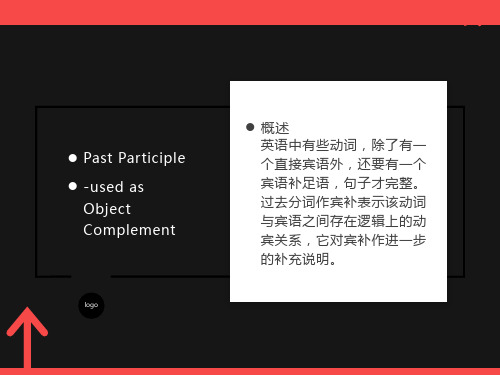
注意:在这一结构中,当宾语为某一身体部位,且作宾补的动词是及物动词时,身体部位通常是过去分词的逻辑宾语,因而过去分词不可换用现在分词。
2. 感官动词 see, hear, notice, observe, watch, feel, find 等后,可用过去分词作宾语补足语。 E.g.:I saw an old man knocked down by a car just now.
3. 使役动词 have, get, make, leave, keep 等后,可用过去分词作宾语补足语。 E.g.: Have you got your films developed?
3. 动词 seat, hide, dress 等的过去分词作宾语补足语一般表示状语而不表示被动的意义,因此,虽然宾语与它们存在逻辑上的主动关系,但也只能用它们的过去分词作宾语补足语。 E.g.: When I came in, I found a strange girl seated in the corner.
在“ have +宾语+过去分词”结构中,过去分词作宾语补足语,have 也可用 get 。这一结构具有以下几种含义:
E.g. :With water heated, we can see the steam.
E.g. :With the matter settled, we all went home.
Байду номын сангаас
21-22版:Grammar——过去分词作宾语补足语(创新设计)
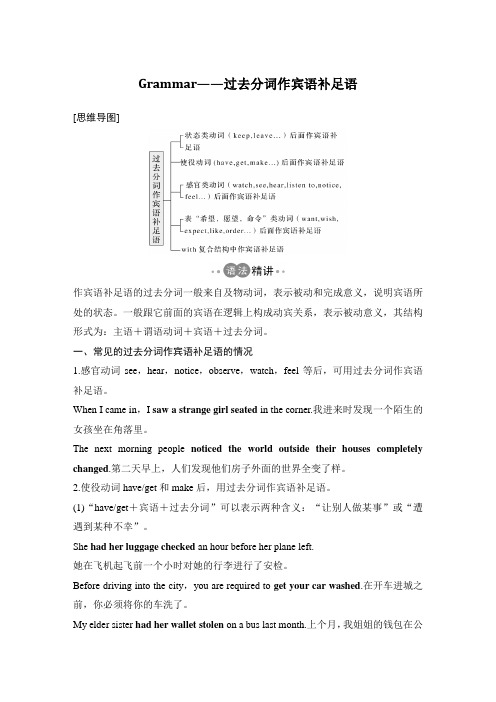
Grammar——过去分词作宾语补足语[思维导图]作宾语补足语的过去分词一般来自及物动词,表示被动和完成意义,说明宾语所处的状态。
一般跟它前面的宾语在逻辑上构成动宾关系,表示被动意义,其结构形式为:主语+谓语动词+宾语+过去分词。
一、常见的过去分词作宾语补足语的情况1.感官动词see,hear,notice,observe,watch,feel等后,可用过去分词作宾语补足语。
When I came in,I saw a strange girl seated in the corner.我进来时发现一个陌生的女孩坐在角落里。
The next morning people noticed the world outside their houses completely changed.第二天早上,人们发现他们房子外面的世界全变了样。
2.使役动词have/get和make后,用过去分词作宾语补足语。
(1)“have/get+宾语+过去分词”可以表示两种含义:“让别人做某事”或“遭遇到某种不幸”。
She had her luggage checked an hour before her plane left.她在飞机起飞前一个小时对她的行李进行了安检。
Before driving into the city,you are required to get your car washed.在开车进城之前,你必须将你的车洗了。
My elder sister had her wallet stolen on a bus last month.上个月,我姐姐的钱包在公共汽车上被偷了。
(2)在“make+宾语+过去分词”这种结构中,过去分词表示结果。
He walked into the room quietly in order not to make himself noticed.他悄悄地走进房间,以免引起别人的注意。
高三英语过去分词做宾语补足语
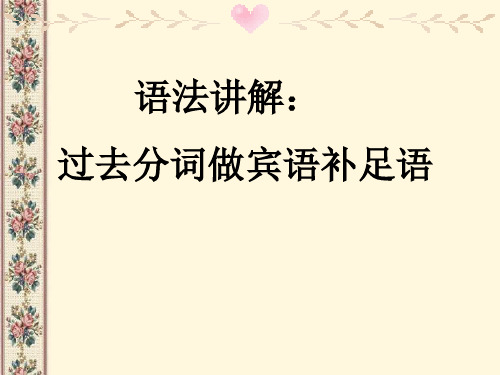
C: 表示希望意义的词 : want , wish, like, expect等
此时宾语补足语与间接宾语的关系绝 大多数是被动或完成的.
e.g. We like the problem settled.
I would like my house painted white.
;陶瓷颗粒胶水 陶瓷颗粒胶粘剂 / 彩色防滑路面厂家 彩色防滑路面价格
2. see, hear, feel, watch, notice 等动词后既可 以加 v-ing 也可以用 to do 但两者之间有区别: 用 v-ing 表示动作正在发生,即发生的过程还 没有结束; 用 to do 表示动作发生了即动作全 过程结束了,用 done 表示 间宾与宾补之间时 被动的关系
D: 位于介词with/without 之后
With everything well arranged, he left the office.
The woman was worrying with her ticket lost.
He left the office without work done yesterday.
;
激发我们追求真实和永恒的智慧。当我们面对人间的一朵好花,心里有美、有香、有平静、有种种动人的质地,就会使我们有更洁净的心灵来面对人生。 ?让我们看待自己如一枝花吧!香给这世界看! (文章有删改) 20.选文采用了的表现手法,以花为线索,按拾花、、爱花、的顺序 构思全文,层层深入,结构严谨。(3分) 代谢:托物言志(或象征、以物喻人)选花(或悟花)变花(或学花) 21.结合语境,说说句中加点词的含义及其作用。(3分) 每一朵花都是安静地来到这个世界,又沉默离开。若是我们倾听,在安静中仿佛有深思,而在沉默里也有美丽的 雄辩。 答: 答题示例:“雄
语法讲解:过去分词做宾语补足语
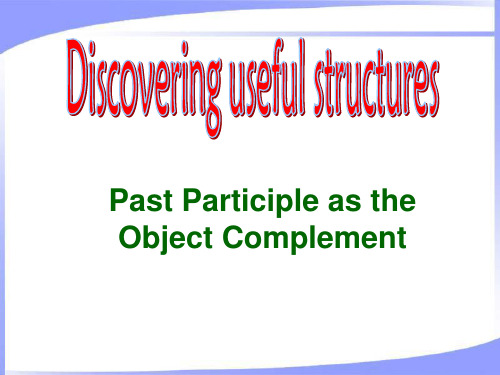
on her birthday. Then Chris asked
Sarah to marry him and they
_______________ had it announced in the newspaper. They had no time to arrange their own
wedding, so they _________________ had the celebration ________ arranged by a company.
学.科.网
Past Participle as the Object Complement
1. Can you find the following sentences in the reading passage?
Now when people refer to England you find Wales included as well. find / … ﹢ past participle
1. We _______________________ have got the house mended now. 2. You look different today. ________ Have you ________________ had your hair cut? 3. Do you want to _________________ have the dictionary ________ delivered to your house or would you prefer to come to the shop for it?
Practice
用所给单词的正确形式填空
surprised 1. What he had said made me ________. (surprise) following 2. There was a terrible noise _____ __ the sudden burst of light. (follow) 3. My glasses are broken. I’ll have to get them repaired ________.(repair) 4. With her fingerpointing _______ to the broken vase, my mother asked me, “Who did that?” (point) to eatonly food 5. The doctor warned him not ________ after the operation. (not eat)
过去分词作宾语补足语讲解

过去分词作宾语补足语讲解
过去分词作宾语补足语是英语语法中的一种结构,通常用于描述被动或完成的动作。
这种结构的构成方式是动词的过去分词形式加上助动词'have, has, had'或'be, am, is, are, was, were'。
例如: I have eaten lunch.(我已经吃过午饭了。
)
The book was written by her.(这本书是她写的。
)这种结构通常出现在及物动词后面,作为宾语的补足语来进一步描述宾语。
在被动语态中,这种结构强调的是动作的接受者,而在完成时态中,它强调的是动作的完成。
需要注意的是,过去分词作宾语补足语时需要与主语保持一致。
例如:
The book has been read by me.(这本书已被我读过。
)
The books have been read by us.(这些书已被我们读过。
)以上就是过去分词作宾语补足语的讲解。
在写作或口语表达中,正确使用这种结构能够使语言更加丰富生动。
- 1 -。
过去分词作宾语补足语

as well. 构。
构。
这首柔美的音乐使我们放松了。
这首柔美的音乐使我们放松了。
Great changes have taken plac e in e in my hometown. my hometown. The work seemed difficult to us. Farmers in our area grow lots of vegetables. Our hotel serves you breakfast in your room. They saw little Tom being punished by his parents. There is a small village below the mountain. 含有宾语补足语的句子变成被动句时,原来的宾语补足语就变成了主语补足语。
含有宾语补足语的句子变成被动句时,原来的宾语补足语就变成了主语补足语。
He was found sleeping under the tree. 他被发现正在树下睡觉。
他被发现正在树下睡觉。
(补充说明主语,与主语之间有逻辑上的主谓关系,是主语补足语)(补充说明主语,与主语之间有逻辑上的主谓关系,是主语补足语)(补充说明主语,与主语之间有逻辑上的主谓关系,是主语补足语)4. 介词的宾语补足语 有些介词的宾语有时也需有补足语,构成介词宾语的复合结构。
有时也需有补足语,构成介词宾语的复合结构。
We were all excited, with the bonfire burning late into the night. 篝火一直烧到深夜,我们都很兴奋。
篝火一直烧到深夜,我们都很兴奋。
(burning 作介词with 的宾语the bonfire 的补足语)的补足语)过去分词作宾语补足语的意义:过去分词作宾语补足语,说明宾语的状态或性质,宾语是其逻辑主语,一般是过去分词动作的承受者,即逻辑上的被动关系。
必修五unit2过去分词作宾语补足语

4. 有时过去分词作宾补可以变为被动
语态, 这时过去分词改作主语补足语,
说明主语所处的状态。
We found the door broken. The door was found broken. She found her bag stolen when she woke up. Her bag was found stolen when she woke up.
3. 意欲want, wish, like
sth./sb. done
4.“with +宾语+过去分词”结构中, 过去分词 用作介词 with 的宾语补足语。这一结构通常 在句中作时间、方式、条件、原因等状语。
The murderer was brought in, with his hands tied behind his back. (表方式)
过去分词作 宾语补足语
三种情况
1. 使役动词get, have, make, keep, leave 等后, 可用过去分词做宾语补足语, 表: “致使某人或某事被…”
We should keep them informed of what is going on here.
Jane got her bad tooth pulled out at the dentist’s.
6. We take English as a useful tool for research work. (用as引出)
7. Whenever you may go, you will find him at work. (介词短语)
8. Let the fresh air in. (副词) 9. The plant has its own name. You
高三英语过去分词做宾语补足语
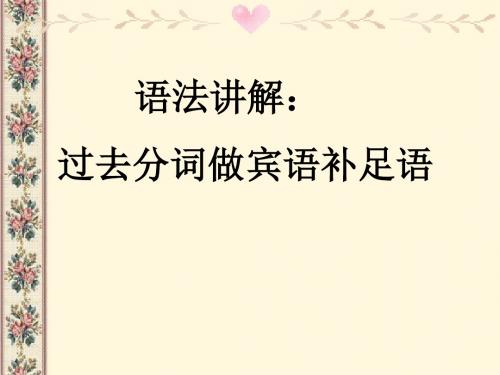
; / 资讯
hxh47kyd
为老太太您担心,您这样慈爱,怎么舍得呢?还是停了它,不要再吃罢!”老太太当时叹道:“我那些儿子媳妇们,只要有你一半上心, 我是样样事情都听他们的了。”就罢了再吃醉瓜的心。此时见,哟,味是那股味儿,玉碗里的瓜,怎么热腾腾的?酒味比夏天当季时还 更浓些,闻起来还是老太太颇爱的长春法酒!这一盘瓜,不是直接送到二太太这边桌上,而是小丫头先端到老太太面前,跪下奉给老太 太看,瓜的上半部,连着蒂儿的一块已经削开了,成了个天然的盖子,奉到老太太面前后,主勺的媳妇上前,把瓜盖也已打开,可以看 到瓜身内不但有微红的熟瓤,还有黄澄澄诱人的糯泥果丁。第六十五章 胜负已分看星芒(3) 媳妇笑吟吟禀报作法:“老太太,这里是 糯米、葛仙米淘净蒸熟,与金糕捣在一道,取蕉脯、橘脯、糖桂花,皆滤去渣滓,熬化于米糕中,加药酒,共置瓜内,蒸熟,问过大夫, 已算不得生冷物色了,老太太可略多用些儿。”嘉颜替老太太舀了一盏,老太太尝了一口,又叫来一盏,推给唐家姑奶奶。唐姑奶奶谢 了,细细品鉴。老太太叫给每人都舀些,又笑道:“省着点!别害他们作东的一桌啃瓜壳子。”掌勺媳妇忙道:“老太太您尽用不妨! 先前掏出的瓜瓤,还有好多,是放在其他容器里蒸的,卖相不如这个,反正要吃的话,吃起来是一样的。”老太太佩服道:“哟!原来 还有藏下的私。”嘉颜笑着,果然给老太太这桌各人都只舀了一些些,又给大太太那桌分了一圈,去了大半个瓜。剩下那两桌,就用掏 出的瓜瓤分享了。这一道用毕,午宴算是结束。戏台上的戏,还在一折一折往下唱,有爱听的,便坐着听下去,困乏了的,便回屋去歇 歇。老太太回去歇一会儿,去之前对福珞和玉笙都加以赞赏,字面看来未有偏倚,但人难免猜,她心中已有褒贬。没人发现宝音做的手 脚,瓜的上层那药酒,药放得特别重些,对老太太身体也不太好。她如果先让给子孙们,那边无妨,如果竟先自己取用了,那就要受损。 宝音看着,老太太果然自己先用,剩下的才分给子孙。这就怪不得宝音了。生死大仇,这里又报了一小寸。这些都吃毕,宝音吩咐下人 将桌上狼藉杯盏收拾,换过细洁小杯小盏,依然盛落花生、杏梅等小食,备听戏的太太 们取用,又将椅子也换成软躺椅,叫人好没规 没矩歪在上头,听起戏来更闲适。福珞既想得没这么周全、更没心思弄这些了,宝音索性替她那桌一并办了,福珞倒也服气,道:“华 妹妹,这次难得你怎么操办得这样好。”宝音谦道:“珞表姊快别这样说。笙儿只是尸位素餐,无功无过,难得珞姐姐远来是客,万般 不凑手,还能办得这样新美,笙儿才敬仰。”福珞听了她这话,心里舒服得多,可也再生不起争竞之意,叹了口气,着丫环扶回
宾语补足语的五种形式

宾语补足语的五种形式
宾补常见的类型有名词作宾语补足语、形容词作宾语补足语、介词短语作宾语补足语、动名词短语作宾语补足语、不定式作宾语补足语、过去分词作宾语补足语等等。
宾语补足语指在英语中有些及物动词,接了宾语意义仍不完整,还需要有一个其他的句子成分,来补充说明宾语的意义、状态等,简称宾补。
1.名词作宾语补足语
We call her Goldilocks. 我没叫他小金锁。
这句话中的宾语是her,Goldilocks跟在her后面,补充说明“叫什么”,这就是名词做宾补。
2.形容词作宾语补足语
My work keeps me busy. 我的工作叫我忙个不停。
此句中,me是宾语,busy补充说明me的状态---忙。
3.介词短语作宾语补足语
I left a case on the train. 我落了个箱子在火车上。
宾语是a case,作为left的宾语,落在哪了?---on the train 火车上。
4.动名词短语作宾语补足语
Don't keep me waiting too long. 别让我等太久。
宾语是me,waiting补充说明“不要让我怎么样”----等太久。
5.不定式作宾语补足语
I asked him to help me. 我要他帮我。
him是宾语,to help me作为him的补足说明:要求他做什么?----帮助我。
6.过去分词作宾语补足语
Could you make yourself understood?你能让自己被理解吗?understood作为宾语yourself的补足说明。
高中英语语法 过去分词作宾语补足语课件(共18张)

A 注意”have+宾语+过去分词”的两种用法: 1 I have had my bike repaired. 2 The villagers had many trees planted
just then.
②表示“遭遇到某种不幸;受到打击”等。 1 My elder sister had her wallet stolen on a bus last month.
高中语法
过去分词作宾语补足语
The Past Participle as the Object Complement
复习与巩固: 分析下列各过去分词作何成分 1.So many thousands of terrified people died. 2.The polluted water was to blame. 3.He became inspired when he thought about helping ordinary people. 4.He got interested in the second theory. 5.She found the door broken in when she came back. 6.He kept the door locked for a long time.
1. Match the two parts to make sentences.
1. Did you find the city 2. When will he ever get the work 3. She cannot make herself 4. Next week I will have my bedroom 5. I got the watch 6. You have got to keep the door 7. She heard her name done? greatly changed? called. understood. locked. repaired. decorated.
高三英语过去分词做宾语补足语

2. see, hear, feel, watch, notice 等动词后既可 以加 v-ing 也可以用 to do 但两者之间有区别: 用 v-ing 表示动作正在发生,即发生的过程还 没有结束; 用 to do 表示动作发生了即动作全 过程结束了,用 done 表示 间宾与宾补之间时 被动的关系
e.g. I see the girl playing under the tree.
Yesterday the woman heard someone cry in the street.
He never heard a word of English spoken before coming to England.
B: 表示使役动词: have, keep, make, gyour eyes open.
Don’t leave such an important thing undone. l have sth done 常有两种含义: 1) 表示让某事被别人做 I had my computer repaired. 2) 表示“受…的影响,蒙受….的损失”。 He had his leg broken in the match yesterday.
美容院加盟店 / 美容院加盟店
D: 位于介词with/without 之后
With everything well arranged, he left the office.
The woman was worrying with her ticket lost.
语法讲解: 过去分词做宾语补足语
1. 过去分词做宾语补足语常出现 在以下动词之后.
- 1、下载文档前请自行甄别文档内容的完整性,平台不提供额外的编辑、内容补充、找答案等附加服务。
- 2、"仅部分预览"的文档,不可在线预览部分如存在完整性等问题,可反馈申请退款(可完整预览的文档不适用该条件!)。
- 3、如文档侵犯您的权益,请联系客服反馈,我们会尽快为您处理(人工客服工作时间:9:00-18:30)。
作宾语补足语的过去分词与宾语之间的关系
1. 及物动词(短语)的过去分词用作宾语 补足语时, 宾语即是过去分词的逻辑宾 语, 宾语和过去分词之间存在逻辑上的 被动关系。
I want the letter posted. 我想把这封信寄出去。
2. 少数不及物动词如 go, change, fall 等的 过去分词作宾语补足语时, 仅表示动作完成。 因此, 宾语与过去分词之间不存在逻辑上 的被动关系。
(省略to的动词不定式)
6.5. We saw her entering the room.
(现在分词或其短语)
5. We must get the work finished by 10 o’clock. (过去分词)
6. We take English as a useful tool for research work. (用as引出)
He got his leg injured. He got his glasses broken.
He got his camera damaged. He got his wallet stolen.
2. 感官动词feel, find, hear, notice, see,watch 等表示感觉和心理状态的动词之后, 表: “感受到某人或某事被做”。
She found her ring gone on her way home. 在回家的路上, 她发现项链不见了。
3. 动词 seat, hide, dress 等的过去分词作宾 语补足语一般表示状语而不表示被动的意义, 因此, 虽然宾语与它们存在逻辑上的主动关系, 但也只能用它们的过去分词作宾语补足语。 如: When I came in, I found a strange girl seated in the corner. 我进来时, 发现一个陌生的女孩坐在角落 me
to play computer games
with my homework _u_n_f_i_n_i_s_h_e_d__.(finish)
• Had+宾语+过去分词作宾补的用法
I had my recorder repaired.
(I asked somebody else to repair it.)
7. Whenever you may go, you will find him at work. (介词短语)
8. Let the fresh air in. (副词) 9. The plant has its own name. You
cannot call it what you will. (从句)
I had my hair __c_u_t__yesterday.
• The house is broken.
• Please get the house _m__e_n_d_e__d_ (mend)
now.
I saw they _c_a_u_g_h_t
in the rain.
• Xiao Xin found all his money __s_t_o_le_n__(steal) on his way home.
过去分词作 宾语补足语
三种情况
1. 使役动词get, have, make, keep, leave 2. 等后, 可用过去分词做宾语补足语, 表:
“致使某人或某事被…”
We should keep them informed of what is going on here.
Jane got her bad tooth pulled out at the dentist’s.
He had his hair cut. He had his clothes washed. He had his room cleaned. He had his walls painted. He had his bike repaired.
hair clothes room walls car
Grammar
Past participles used as object
complement
(过去分词做宾语补足语)
概述
英语中有些动词,除了有一个 直接宾语外,还要有一个宾语 补足语,句子才完整。过去分 词作宾补表示该动词与宾语之 间存在逻辑上的动宾关系,它 对宾补作进一步的补充说明。
带有宾语补足语的一般句型为:
某些及物动词 +直接宾语 + 宾语补足语 宾语 宾补
We think him clever. What he said made me angry. They consider the answer correct. Everyone calls him Tom.
哪些可以做宾补?
1. His father named him Daming. (名词) 2. They painted their house white. (形容词) 3. You mustn’t force him to lend his 4. money to you.(动词不定式) 5.4. Nobody noticed him enter the room.
I had the room cleaned.
(I organized it.)
He had his foot injured.
(something bad happened.)
Note1
“使役动词 have + 宾语+过去分词”
的几种含义
• 1. 意为“主语请别人做某事”。例如: • He wants to have his eyes examined tomorrow.
• 2. 意为“主语遭遇、遭受某一不愉快、不测的事情”。 • Be careful, or you'll have your hands hurt.
• 3. 意为“使完成某事”,事情既可以是别人做完,也可以 由主语参与完成
• He had the walls painted this morning. 他今早把墙漆了。(主语自己可能参与)
